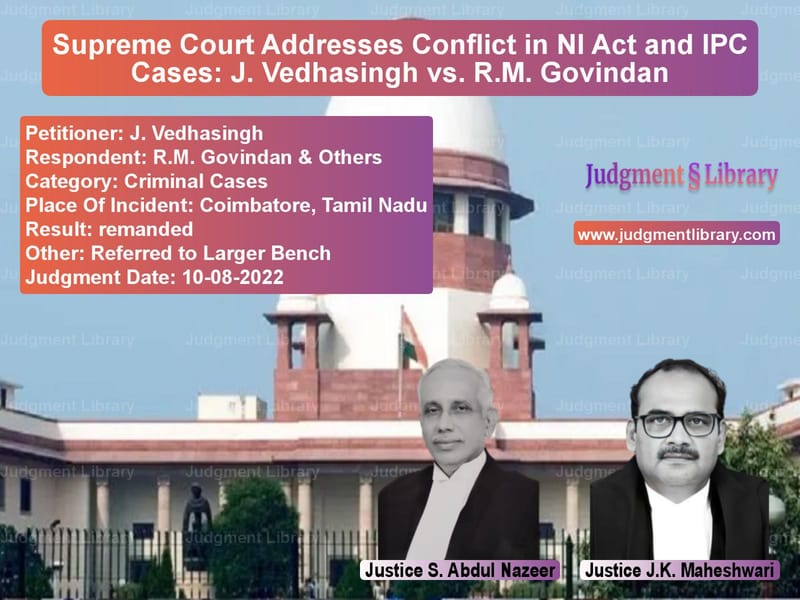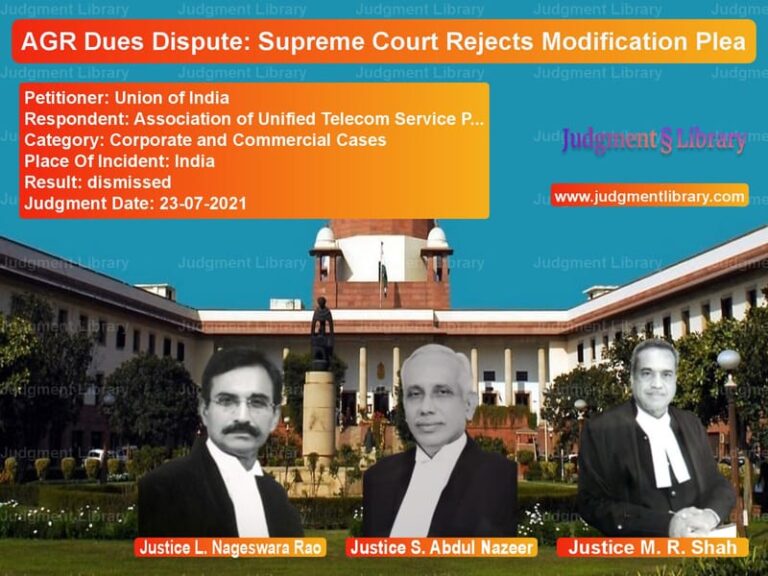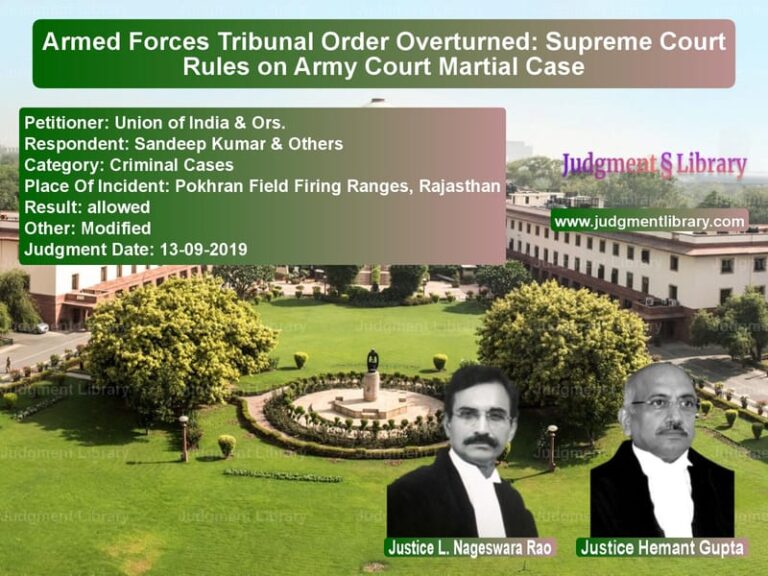Supreme Court Addresses Conflict in NI Act and IPC Cases: J. Vedhasingh vs. R.M. Govindan
The Supreme Court of India, on August 11, 2022, delivered a crucial judgment in the case of J. Vedhasingh vs. R.M. Govindan & Others. This case revolved around the interplay between Section 138 of the Negotiable Instruments Act, 1881 (NI Act) and Sections 406, 420, 120B, and 34 of the Indian Penal Code (IPC), addressing the legal question of whether an accused can be simultaneously prosecuted under both statutes for the same set of facts.
The Supreme Court ruled that conflicting judgments on this issue existed, leading the bench to refer the matter to a larger bench to ensure legal consistency. This ruling has significant implications for financial fraud and dishonored cheque cases.
Background of the Case
The case originated from a dispute where the appellant, J. Vedhasingh, a civil engineer, had invested Rs. 62,32,754 in a profit-sharing real estate development agreement with the respondents in Coimbatore, Tamil Nadu. Despite assurances, the respondents neither shared the profits nor returned his money.
To settle the debt, the respondents issued a cheque of Rs. 87,00,000 on September 9, 2015, which was dishonored due to insufficient funds. This led to two parallel legal proceedings:
- A criminal complaint under Section 138 of the NI Act (Cheque Bounce Case).
- A separate criminal complaint for cheating and criminal breach of trust under Sections 406, 420, 120B, and 34 of the IPC.
The Madras High Court quashed the IPC case, ruling that the NI Act already covered the allegations. Aggrieved, J. Vedhasingh appealed to the Supreme Court.
Key Legal Issues
The Supreme Court had to determine:
- Whether an accused can be prosecuted under both the NI Act and IPC for the same transaction.
- Whether the Madras High Court was justified in quashing the IPC proceedings.
- Whether the elements of cheating (Section 420 IPC) and dishonored cheque (Section 138 NI Act) were distinct.
Arguments from the Petitioner (J. Vedhasingh)
The petitioner’s counsel contended:
- The NI Act only deals with cheque dishonor, not fraudulent intent or breach of trust, which the IPC covers.
- While mens rea (criminal intent) is not required for an NI Act case, it is crucial in an IPC offense.
- In similar cases, the Supreme Court had ruled that simultaneous proceedings under both statutes could continue.
- Quashing the IPC case would allow fraudsters to escape more stringent punishment.
Arguments from the Respondent (R.M. Govindan & Others)
The respondents’ counsel argued:
- The cheque dishonor case under the NI Act sufficiently addressed the issue, making the IPC case redundant.
- The double jeopardy principle (Article 20(2) of the Constitution and Section 300 CrPC) prevented prosecution for the same offense twice.
- The Supreme Court had, in past cases, quashed IPC proceedings where the NI Act covered the same facts.
Supreme Court’s Observations
1. Conflicting Precedents
The Court acknowledged that previous judgments had taken contradictory stances:
- Sangeetaben Mahendrabhai Patel vs. State of Gujarat (2012): Allowed prosecution under both statutes, stating that the elements of cheating (Section 420 IPC) and cheque dishonor (Section 138 NI Act) were different.
- Kolla Veera Raghav Rao vs. Gorantla Venkateswara Rao (2011): Held that prosecuting someone for cheating under IPC after they had been convicted under Section 138 NI Act violated the double jeopardy principle.
- G. Sagar Suri vs. State of UP (2000): Ruled that the NI Act was sufficient and IPC cases should not be filed in parallel.
2. Legal Principle on Mens Rea
The Court observed:
“The requirement to prove mens rea is different under the IPC and the NI Act. While an NI Act offense does not require fraudulent intent, Section 420 IPC specifically deals with dishonest intention.”
3. Need for Larger Bench
Given the conflicting precedents, the Court referred the issue to a larger bench, stating:
“To maintain consistency in law, this matter must be resolved by a larger bench.”
Final Judgment
The Supreme Court:
- Referred the case to a larger bench for an authoritative ruling.
- Ordered that pending IPC proceedings should not be quashed until the larger bench decides.
- Held that accused persons cannot automatically escape IPC prosecution by invoking the NI Act.
Impact of the Judgment
The ruling has broad implications:
- Clarifies double jeopardy concerns: Ensures that accused persons do not misuse the NI Act to avoid fraud charges.
- Strengthens legal remedies for victims: Allows for criminal liability beyond just financial penalties.
- Influences pending cheque fraud cases: Many cases will be affected based on the larger bench’s future ruling.
Conclusion
The Supreme Court’s judgment in J. Vedhasingh vs. R.M. Govindan is a significant step in clarifying the law on parallel prosecutions under the NI Act and IPC. The final decision from the larger bench will have long-term implications for financial fraud cases and corporate liability in India.
Petitioner Name: J. Vedhasingh.Respondent Name: R.M. Govindan & Others.Judgment By: Justice S. Abdul Nazeer, Justice J.K. Maheshwari.Place Of Incident: Coimbatore, Tamil Nadu.Judgment Date: 10-08-2022.
Don’t miss out on the full details! Download the complete judgment in PDF format below and gain valuable insights instantly!
Download Judgment: j.-vedhasingh-vs-r.m.-govindan-&-othe-supreme-court-of-india-judgment-dated-10-08-2022.pdf
Directly Download Judgment: Directly download this Judgment
See all petitions in Fraud and Forgery
See all petitions in Cheque Dishonour Cases
See all petitions in Debt Recovery
See all petitions in Judgment by S. Abdul Nazeer
See all petitions in Judgment by J.K. Maheshwari
See all petitions in Remanded
See all petitions in Referred to Larger Bench
See all petitions in supreme court of India judgments August 2022
See all petitions in 2022 judgments
See all posts in Criminal Cases Category
See all allowed petitions in Criminal Cases Category
See all Dismissed petitions in Criminal Cases Category
See all partially allowed petitions in Criminal Cases Category







